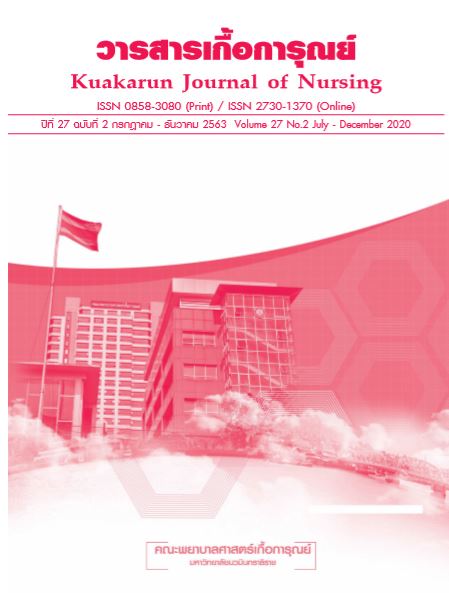การส่งเสริมความรอบรู้ทางสุขภาพเพื่อป้องกันโรคอ้วนในเด็กนักเรียนเขตเมือง: บทบาทพยาบาลกับการใช้หลักฐานเชิงประจักษ์
คำสำคัญ:
ความรอบรู้ทางสุขภาพเพื่อป้องกันโรคอ้วน, เด็กนักเรียน, เขตเมือง, บทบาทพยาบาล, หลักฐานเชิงประจักษ์บทคัดย่อ
ปัญหาน้ำหนักเกินและโรคอ้วนในเด็กทุกกลุ่มอายุของประเทศไทยมีความชุกเพิ่มขึ้นอย่างรวดเร็ว โดยเฉพาะกลุ่มเด็กนักเรียน 6-14 ปี ในเขตเมือง ปัญหานี้นอกจากจะส่งผลกระทบรุนแรงต่อภาวะสุขภาพและคุณภาพชีวิตของเด็กและครอบครัวในปัจจุบัน และในอนาคตแล้ว ยังส่งผลเชิงลบต่อการพัฒนาเศรษฐกิจของประเทศ การแก้ไขปัญหาอย่างยั่งยืนจึงต้องมุ่งเน้นไปที่การพัฒนาความสามารถของประชาชนให้มีความสามารถในการดูแลสุขภาพตนเอง โดยการสร้างเสริมให้ประชาชนทุกกลุ่มวัยมีความรอบรู้ด้านสุขภาพ ดังที่ได้ถูกกำหนดไว้ในแผนพัฒนาสุขภาพแห่งชาติฉบับที่ 12 ปี พ.ศ. 2560-2564 พยาบาลเป็นบุคลากรที่สำคัญในการขับเคลื่อนนโยบายและแผนงานดังกล่าว ดังนั้นพยาบาลต้องมีความรู้ความเข้าใจในแนวคิดทฤษฎีของความรอบรู้ทางสุขภาพ แนวคิดและกระบวนการใช้หลักฐานเชิงประจักษ์ และมีสมรรถนะในการสืบค้น วิเคราะห์และประเมินหลักฐานเชิงประจักษ์ของความรอบรู้ทางสุขภาพที่เหมาะสมกับเด็กนักเรียนเขตเมือง ที่สำคัญต้องมีการนาหลักฐานเชิงประจักษ์สู่การประยุกต์ใช้ในบทบาทพยาบาลการส่งเสริมความรอบรู้ทางสุขภาพ เพื่อป้องกันโรคอ้วนให้กับเด็กนักเรียนในเขตเมือง ซึ่งสามารถประยุกต์ใช้ในกระบวนการพยาบาลได้ใน 4 ขั้นตอน คือ (1) การประเมินความรอบรู้ทางสุขภาพ (2) การวินิจฉัยปัญหา (3) การวางแผนสู่ปฏิบัติการ (4) การประเมินผลลัพธ์และทบทวน
เอกสารอ้างอิง
World Health Organization Consultation. Obesity : preventing and managing the global epidemic. Geneva: E-Publishing Inc; 2000.
Society of Pediatric Nutrition of Thailand. Guidelines for prevention and treatment of obesity in children 2014 [Internet]. 2014 [cited 2020 may 5]. Available from: http://www.thaipediatrics. org/Media/media-20161208151655.pdf (in Thai)
World Health Organization. Obesity and overweight [Internet]. 2019 [cited 2020 may 5]. Available from: https://www.who.int/news-room/fact-sheets/detail/obesity-and-overweight
Ministry of Public Health, Department of Health. Department of Health Annual Report, Thailand 2017 [Internet]. 2018 [cited 2020 may 6]. Available from: http://planning.anamai.moph.go.th/download/D_report_year/Report_DoH61.pdf (in Thai)
Ekphlakron V. Thai public health survey report by physical examination 4th 2008-2009, National Health Examination Survey Office. Bangkok: Graphico Systems; 2011. (in Thai)
Ekphlakron V. Thai public health survey report by physical examination 5th 2014. Bangkok: Graphico Systems; 2016. (in Thai)
Ministry of Public Health, Strategy and Planning Division. Statistical Thailand 2016 [Internet]. 2016 [cited 2020 may 6]. Available from: http://bps.moph.go.th/new_bps/sites/default/files/For%20Website_Statistical%20Thailand%202016.pdf (in Thai)
Ministry of Public Health, Division of Non Communicable Diseases. Annual report 2017. Bangkok: Aksorn Graphic & Design; 2017. (in Thai)
Ministry of Public Health, National Committee for the Development of the 12th National Health Development Plan. National Health Development Plan 12th ed (2017-2021). Nonthaburi: Ministry of Public Health; 2016. (in Thai)
World Health Organization. Health literacy and health promotion. Definitions, concepts and examples in the eastern mediterranean region. Individual empowerment conference working: document. 7th global conference on health promotion promoting health and development. Nairobi, Kenya [Internet]. 2009 [cited 2020 may 5]. Available from: https://www.who.int/ healthpromotion/conferences/7gchp/Track1_Inner.pdf
Nutbeam D. Health literacy as a public health goal: a challenge for contemporary health education and communication strategies into the 21st century. Health Promotion International 2000;15(3):259-67.
Nutbeam D. The evolving concept of health literacy. Social Science & Medicine 2008;67(12):2072-8.
Manganello JA. Health literacy and adolescents: a framework and agenda for future research. Health Education Research 2008;23(5):840-7.
Department of Health Service Support, Health Education Division. The results of the assessment of health literacy and health behavior among Thai children and youth according to the national health act. Nonthaburi: Health Education Division; 2016. (in Thai)
Picheansathian W. Searching for evidence: essential skills of nurses in Thailand 4.0. Thai Journal of Nursing and Midwifery Practice 2018;5(1):136-48. (in Thai)
Kanhadilok S, Punsumreung T, Malai C. Evidence based teaching strategies in nursing. Journal of Nursing and Health Care 2017;35(4):34-41. (in Thai)
Kummatid A, Markrat M. Using the systematic review to provide a complete summary on a research question in evidence-based practice: a 3-step method. The Southern College Network Journal of Nursing and Public Health 2017;3(3):246-59. (in Thai)
Thipwong A, Numphol J. The associations tetween health literacy related to obesity and health behaviour : eating and exercise in overnutritional children, Bangkok. Journal of Public Health Nursing 2014;28(2):1-11. (in Thai)
Intarakamhang U, Intarakamhang P. Health literacy scale and causal model of childhood overweight. Journal of Research in Health Sciences 2017;17(1):e00368.
Thongsong L, Neranon W. Health literacy for obesity prevention of school-age children in Bangkok Metropolitan [research report]. Bangkok: Navamindradhiraj University; 2020. (in Thai)

















